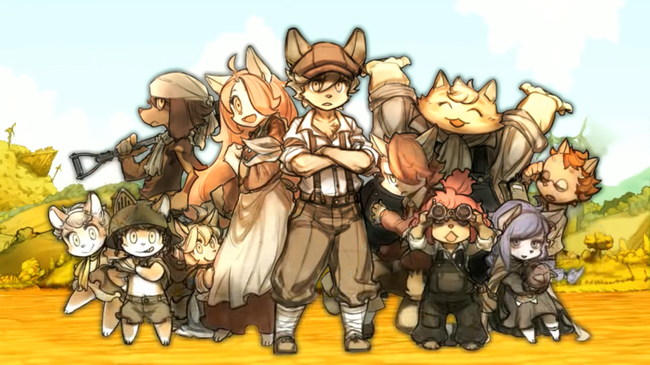
On the eve of their 30th anniversary, CyberConnect2 looks firmly towards the future
Like clockwork, every year CyberConnect2 will attend Anime Expo. While one or two bits might change, a number updated, every year they hold a similar panel - centered around the company's history, and a desire to recruit workers from outside of Japan. This year was no different. Similarly, every year I sit down to chat with CyberConnect2's Vice President Taichiro Miyazaki, to speak about the state of the company; what's coming up in the pipeline, and more.
While all of that remains true for our talk we had this year, a few things have changed. For one, the Fuga: Melodies of Steel trilogy has finished; as such, it feels like a blank slate for the company moving forward. A first for me, as well - when I first spoke with Miyazaki in 2019, it was after the team had made the original Fuga playable in public for the very first time; a version that would end up feeling quite different from the game we inevitably received.

Last year, Miyazaki stated that the company was currently planning to work on Cecile next after the Fuga trilogy had been completed, and this year saw a reconfirmation. In fact, the company plans to officially start talking about the project in more detail next year. When asked about the other title in the previously announced Trilogy of Vengeance, however, things aren't looking so concrete.
"For Tokyo Ogre Gate - we actually started development back up a bit, but we ended up scrapping what we had in the end. We're starting over from the original proposal - so it's going to take a bit longer to realize." Tokyo Ogre Gate was announced alongside the original Fuga: Melodies of Steel and Cecile back in early 2018; meaning that in all likelihood, we'll be looking at something close to a 10 year gap from the original announcement to release.
On the bright side, CyberConnect2 has already decided on what they want to tackle next after the Trilogy of Vengeance is completed. Every year, CyberConnect2 holds an internal game jam for staff to pitch new projects, and indeed some of those titles have already been decided on - though if there's anything being their own publisher has taught them, it's been a certain level of restraint, and deciding on what's really important to CyberConnect2 as a company. To that end, with Little Tail Bronx - the series comprising Tail Concerto, Solatorobo and Fuga - the company has already begun talks about what comes next for the franchise. Of course, it's still too early to share any concrete details.

"Unfortunately, we do have to think about sales if we're self-publishing - which means we have to take the time to really consider every aspect of the games that we decide to publish directly under our name." While it was left unsaid, sometimes plans change. The original Fuga was meant to release in 2019, before getting massively retooled into a much different game before its release in 2021. Doubtlessly Cecile and Tokyo Ogre Gate may retain very little of what the company originally revealed of either game 7 years ago; by the time either release, both games' development will have comprised over a quarter of CyberConnect2's existence as a company.
Speaking to that legacy, CyberConnect2's 30th anniversary is on February 16, and Miyazaki was excited to share that the company has big plans for an endeavor they plan to announce next year to coincide with such a major milestone. Again, however, it's still too early to get any more details about what that may entail.
What I did manage to get an answer for was a question that's been building up inside me for the last several years. Every time CyberConnect2 attends a convention outside of Japan, there's been one constant; the sales pitch to recruit creatives from countries such as the United States, France and elsewhere. Exactly what drives CyberConnect2 to keep beating this drum, and what makes it such an important issue for the company? The answer, as it turns out, is multifaceted. On one hand, consistently CyberConnect2's games have sold better outside of Japan compared to domestic sales. Yet, there's more to it than just that alone.
"We assume, since we've been present on the market for 30 years now, that lots of players in the U.S. have grown up playing our games, and that they may now want to be creatively involved in the kind of game development we have been able to do. So, you know, when we make these games in Japan - while we're looking at the global audience when we develop games, it feels appropriate to recruit from the same places where our games sell the best."

While CyberConnect2, the Japanese company, may have some idea what might sell globally - there's an understanding that developers from other regions directly may bring a different perspective to the table. Ideally, it can bring a whole new synergy to a project that might otherwise have been impossible to deliver with a Japanese perspective alone. Yet even beyond that, CyberConnect2 has yet another reason to want to recruit from a global workforce.
"On the more logistical side of things - well, Japan has a declining population. In the long run, that means that our workforce is also decreasing over time." Soon, CyberConnect2 will be 30 years old, and for the health of the company it's clear to consider all potential obstacles, and how best to overcome them. What better solution to a declining workforce within the next 30 years, than to look towards the company's own audience, which exists primarily outside of Japan?
Perhaps now more than ever, CyberConnect2 is once again at a crossroads. It's hard to say what things will look like for the company even a year from now, yet it's clear that CyberConnect2 will continue to look forward not just towards their next game release, but also the next 30 years ahead and beyond.